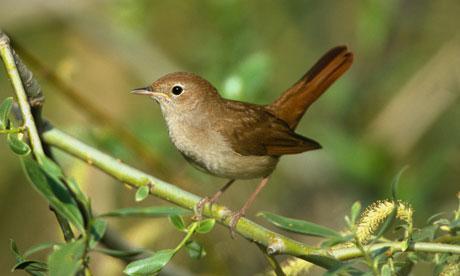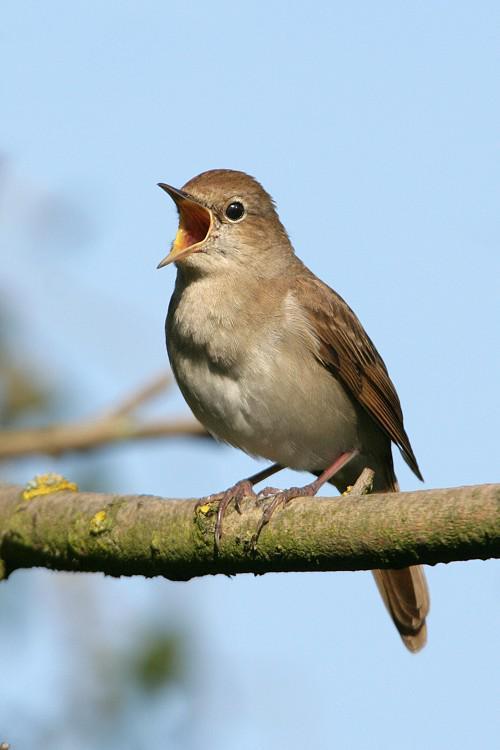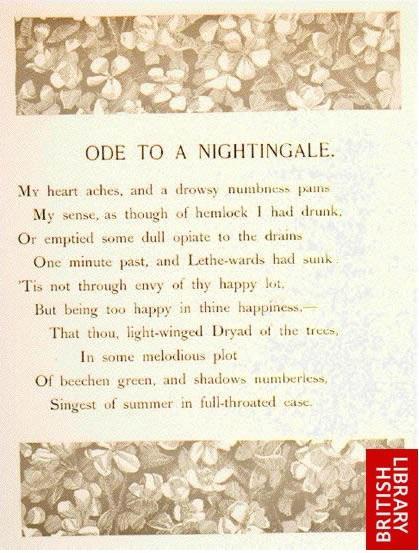
Chris Rose just created the petition "Broadcast Nightingales live on BBC radio this May 18th" and wants you to add your name too. This campaign means a lot to Chris and the more support we can get behind it, the better chance we have of succeeding. You can sign the petition here.
Thank you!
.
SUPPORTED BY HEROES LIKE YOU
Support independent eco journalism that drives real change.Message to BBC: Dear BBC At midnight on 18th May 1924 a million people tuned in to BBC radio to hear your first ever live Outside Broadcast: of a Nightingale singing in a Surrey wood as cellist Beatrice Harrison played music. 50,000 people were so moved that they wrote letters in response. It became an annual BBC tradition - until World War II in 1942. We ask you to re-start these broadcasts and re-connect people all over Britain with the song of the Nightingale, live, this May 18th. This and many of other songbirds are in steep decline: by broadcasting the song of the Nightingale you will enrich our lives, and may inspire us to keep a place for Nightingales in the lives of our children, and theirs.
Here’s the reasons why:
Anyone who has ever heard the song of a Nightingale, knows the extraordinary heart-lifting, soul-penetrating power of the voice of this bird. Once they were commonplace: Keats wrote 'Ode to a Nightingale' while listening to one in his Hampstead garden. As a teenager growing up in Ruislip in the London suburbs, I heard just one signing Nightingale, despite the large ancient woodlands there, yet I was told that during WW II, they were common enough that people living next to the woods complained about the noise of singing Nightingales keeping them awake at night. Fewer and fewer people now get to ever hear the song of a real live Nightingale. They have declined 55% just since 1995. Why ? It is a mystery almost as deep as how it is that the song of the Nightingale mainlines straight to our hearts. But we do have some idea. Back in 1942, the BBC's hugely popular 'Midnight Nightingale Broadcasts' were brought to an abrupt end when an engineer realized that they were about to broadcast the background sound of RAF bombers massing overhead, before setting off to strike Germany. So he pulled the plug. Today the Nightingale is under a very different sort of threat: researchers think a combination of climate change and farm development in its African wintering grounds, the destruction of nesting habitat by introduced Muntjac deer in this country, poor woodland management and pesticides, may all play a part. The Nightingale is but one of many songbirds, which for similar reasons, are rapidly vanishing from our countryside, our urban green sanctuaries and suburban woods, and thus from our lives. It seems that developers and politicians do not care enough to keep even the clearest most obvious threats at bay - for example at Lodge Hill in Kent, Britain's only woodland specifically designated as a valued breeding site for Nightingales, over 80 singing Nightingales are threatened with development for new houses. If our society cannot save the Nightingale, it cannot save very much of what makes life really worth living. Yet as David Attenborough has said, "No one will protect what they don’t care about; and no one will care about what they have never experienced". You can hear the evocative, liquid song of that lone, long-dead Nightingale from 1942, with the drone of bombers in the background. It was recorded but never broadcast. Now it's time for the BBC to re-start the tradition, not to run a campaign but to enrich our quality of life, to at least give its millions of listeners the chance to hear a real, live Nightingale singing, if only once a year. Chris
.
Chris Rose works as a campaigns and communications consultant based in Norfolk, UK. Trained as an ecologist he helped found London Wildlife Trust and Media Natura, was Countryside Campaigner for Friends of the Earth, worked for WWF International and was Deputy Executive Director of Greenpeace. He runs Campaign Strategy Ltd, a free campaign planning website at www.campaignstrategy.org, and helps his partner Sarah Wise run the Fairyland Trust, a charity connecting children with nature through magic and folkore, www.fairylandtrust.org. He has a lifelong love of birds.
.
.
Sonnet–To the Nightingale
My heart aches, and a drowsy numbness pains My sense, as though of hemlock I had drunk,Or emptied some dull opiate to the drains One minute past, and Lethe-wards had sunk:‘Tis not through envy of thy happy lot, But being too happy in thine happiness,— That thou, light-winged Dryad of the trees In some melodious plot Of beechen green, and shadows numberless, Singest of summer in full-throated ease. Part of ‘Ode to a Nightingale’ by John Keats: full poem hereThy liquid notes that close the eye of day First heard before the shallow cuckoo’s bill, Portend success in love.John Milton Quotes , Source: _‘_Sonnet–To the Nightingale’





